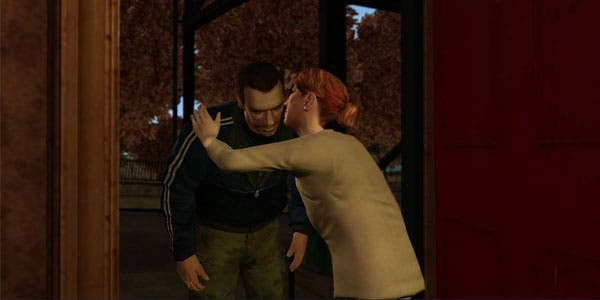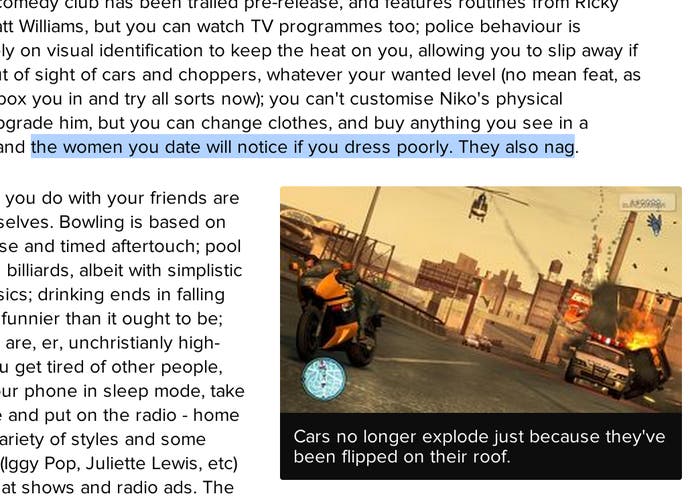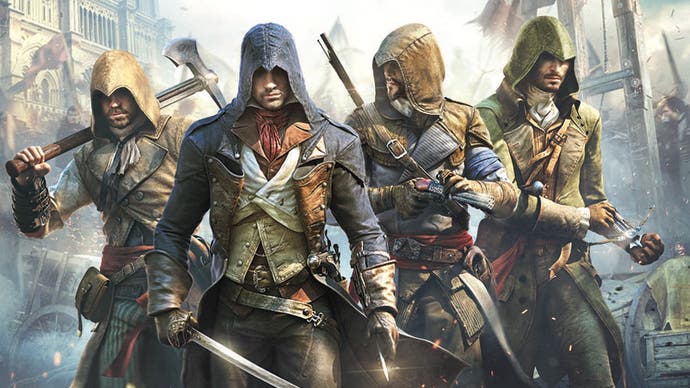Editor's blog: I am sexist
Let's talk about how, why and what I'm doing about it.
Are you sexist? I am.
This is a realisation that has slowly dawned on me over the last few years. Without really meaning to do so, I have been going around saying and doing things that demean women and casually downplay the importance of issues of gender discrimination all my life. It's a horrible thing to recognise about yourself, gradually or not. I try to be a generous and caring person and I am pretty sensitive, so the idea that I have been ignorantly treating half of the people I know and love in this way makes me feel awful.
Given the subject at hand, the irony of pointing out how this makes me feel is something I am aware of, so I won't dwell on it too much, except to say that understanding you are sexist is actually really quite difficult just on a practical level. When I look around, I see the same things I've been doing and saying without thinking about them reflected back at me from every angle, and the fact casual sexism is so prevalent is an amazingly effective masking agent for the concept itself, especially among men. (I'm talking to men, of course. I know that our female readers - by virtue of being women - do not need me to point out that the average male is sexist.)

I don't know exactly when I realised I was sexist, but I can show you how I notice historical examples of it. Yesterday, for example, I saw some friends talking about the "Dastardly" achievement in Red Dead Redemption. Do you remember this one? XboxAchievements.com, which I assume scrapes data from Xbox Live and is therefore probably reporting the developer's original wording, describes it thus: "Place a hogtied woman on the train tracks, and witness her death by train." So the objective is to locate a woman who cannot defend herself against you, tie her up and then kill her by placing her in the path of a train. You cannot gain the achievement by performing this act on a man. I am not a student of Westerns so I cannot comment on its original context (and I bet a proportion of the game's player base that it would be statistically acceptable to round up to 100% are in the same situation), so it's just a contextless act of violence against women that gamifies something that we dimly remember as being associated with a film genre.
I remember that achievement. I remember doing it in the game. This would have been in 2010. The only reaction I remember having to it is thinking it was clever and inventive, drawing on a famous Western trope. I don't remember having any conscious thought that it was troubling. If I did, I obviously suppressed it.
The things I probably find most haunting about my sexism though are the sexist things I've written and published. Unlike a lot of my friends and peers, I didn't start in print, where copy can vanish forever quite easily, and I have only worked for Eurogamer, which maintains a pretty complete live archive of content. I'm 30 now and I've worked here since I was 16. So if you go through stuff I've written in that period, you can uncover some things I find shameful and embarrassing, and occasionally they float into my field of vision again. Here's a line from my Grand Theft Auto 4 review, published in 2008, in a paragraph about attention to detail: "Women you date will notice if you dress poorly. They also nag."
Can someone please submit that to @everydaysexism?

The fact that things like the Red Dead achievement passed unacknowledged as recently as 2010 (apologies if you were shouting about it at the time and I didn't listen - I am sexist, as previously discussed) is a bit disturbing, but it and that snippet of my writing are examples of things that just aren't on a sexist's radar. These days, now I am conscious of my sexist instincts, I see them all the time and I want to discuss them.
And this leads me on to the crux of the issue: it's really hard to talk about sexism (in games or otherwise) when a large proportion of your audience hasn't realised it is sexist, whether subtly or profoundly. The discussion my friends were having yesterday was unique in that it was being conducted between people who all generally recognise and act against sexism when they encounter it, so while it was recognisably conducted from behind the thousand-yard stares of sadness I see quite a lot during these conversations, it wasn't heated or intense. Someone pointed out Dastardly was based on a film trope but felt a bit off. Someone suggested thinking about how you'd feel if a game asked you to re-enact something from Schindler's List. Someone wondered aloud whether developers should gamify history. I wondered (though did not jump in - I wrote this piece instead) about the wider issue of creative responsibility, often mentioned around things like the infamous "No Russian" level in Modern Warfare 2.
But if I had written something on Eurogamer about realising that the Dastardly achievement was troubling, and then tried to explore that, a silent majority might have found some merit in what I was saying, but I know what the comments would have looked like. 1) This isn't as important as something else. 2) Bloody white knight - you're just trying to impress women. 3) It's historically accurate. 4) Stop attacking the developer's creative vision. 5) Stop trying to censor people. 6) This is political correctness gone mad - what's next? Forcing X to do Y? 7) Bloody social justice warrior.
The thing about those comments - this isn't a straw man argument, by the way; go read the comments on my article about gender representation in Assassin's Creed Unity - is that I don't think they come from a place of actual misogyny. I think they are just a byproduct of the kind of casual ignorance I have personally embodied for pretty much all of my sexist life. And when you have an entrenched attitude that you may not fully recognise and you are confronted by arguments that go to the core of that attitude, it's easy to get upset, because it feels like a personal attack. Your natural response is to try to change the subject, attack the speaker or frame the argument differently, rather than engaging with the thing you can't comprehend at the heart of the original point.

By the way, one reason I think I have a handle on the mindset behind these comments is that I'm pretty sure I used to write these comments as well. After all, I am sexist.
It's also worth remembering that the gaming community is an emotionally charged one - we're defensive because we're used to being vilified by mainstream media, we're loyal to games, characters and developers who have brought us so much pleasure and we, like all humans, fear what we do not immediately understand. I feel as though these aspects of the person who self-identifies as a gamer, as I do, probably act as an accelerant for the deep-seated, unresolved negative attitudes to women that are part of our social heritage, and to say this all plays a part in the tone and intensity of the negative reaction to people who write the sorts of things I'm writing today is an understatement.
Speaking of which, why am I writing any of this? I don't just mean because it is only tangentially to do with gaming. We are a gaming community, and the concept of community is built on a foundation of social interaction, so the discussion of social issues should be indivisible from gaming community, even though it doesn't always feel as though it is.
Well, I'm writing this for a couple of reasons.
Firstly, it's because among the many comments that didn't make me feel so good when I wrote about this subject last week, there were a few that did. I also received a few emails from readers who agreed and wanted to tell me so, and a few people tweeted their support. So I am writing this because I hope that if I stand up and admit that I am sexist, have always been sexist and will probably always have to rebel against this bit of programming in my head whenever it is triggered, one or two people will realise that they can relate to what I'm saying, and that will give them a bit of courage to try to do something about it as well.

Secondly, I'm writing because I think attitudes are gradually changing and I want to acknowledge that and offer it as encouragement to anyone who wants or needs some encouragement. Clearly my own attitude has changed. That line in the GTA 4 review would be unthinkable to me now. I wouldn't let the Dastardly achievement pass without comment now if I was aware of it. And as Elisa Melendez wrote on Polygon during E3, there are signs that issues of representation are being slowly addressed in games more broadly, which is good.
Something I always try to keep in mind - usually when I read tweets like this one from Rust developer Garry Newman or negative comments on good work by GamesIndustry.biz or come across a response to one of Anita Sarkeesian's superb videos - is a thing Martin Amis writes about racism in his book Experience. He says that he is a little bit racist, but he realises he is slightly less racist than his father, who was slightly less racist than his father, and he observes that this is progress. It is gradual, as it is with issues of gender representation in games and the growing acknowledgement of sexism in society at large, but we can be encouraged by it even though there is more to do.
Martin Amis's book is also the reason I keep saying I am sexist and not that I was sexist. I will have to keep fighting this thing about myself. I will make mistakes along the way - my id will take over and I'll say the wrong thing from time to time. This is an article about acceptance, not a self-awarded pardon. But while I feel sad about that, and embarrassed or ashamed when I recall examples of it in things I have said or done in the past, I don't want those emotions to prevent me doing the right thing now, which is something I think has probably been the case in recent years as I've come to terms with my own sexism. So I am writing to make that clear.
I want people who share these views, whether they actively promote them or not, to know that as Editor-in-Chief of Eurogamer, I will now try to get this right in everything we do. I want this to be a good place, a safe place. And I want to ask for your patience and support while I work towards that. Thank you.

